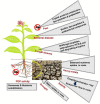Bacillus: A Biological Tool for Crop Improvement through Bio-Molecular Changes in Adverse Environments
- PMID: 28932199
- PMCID: PMC5592640
- DOI: 10.3389/fphys.2017.00667
Bacillus: A Biological Tool for Crop Improvement through Bio-Molecular Changes in Adverse Environments
Abstract
Crop productivity is affected by environmental and genetic factors. Microbes that are beneficial to plants are used to enhance the crop yield and are alternatives to chemical fertilizers and pesticides. Pseudomonas and Bacillus species are the predominant plant growth-promoting bacteria. The spore-forming ability of Bacillus is distinguished from that of Pseudomonas. Members of this genus also survive for a long time under unfavorable environmental conditions. Bacillus spp. secrete several metabolites that trigger plant growth and prevent pathogen infection. Limited studies have been conducted to understand the physiological changes that occur in crops in response to Bacillus spp. to provide protection against adverse environmental conditions. This review describes the current understanding of Bacillus-induced physiological changes in plants as an adaptation to abiotic and biotic stresses. During water scarcity, salinity and heavy metal accumulate in soil, Bacillus spp. produce exopolysaccharides and siderophores, which prevent the movement of toxic ions and adjust the ionic balance and water transport in plant tissues while controlling the pathogenic microbial population. In addition, the synthesis of indole-3-acetic acid, gibberellic acid and1-aminocyclopropane-1-carboxylate (ACC) deaminase by Bacillus regulates the intracellular phytohormone metabolism and increases plant stress tolerance. Cell-wall-degrading substances, such as chitosanase, protease, cellulase, glucanase, lipopeptides and hydrogen cyanide from Bacillus spp. damage the pathogenic bacteria, fungi, nematodes, viruses and pests to control their populations in plants and agricultural lands. The normal plant metabolism is affected by unfavorable environmental stimuli, which suppress crop growth and yield. Abiotic and biotic stress factors that have detrimental effects on crops are mitigated by Bacillus-induced physiological changes, including the regulation of water transport, nutrient up-take and the activation of the antioxidant and defense systems. Bacillus association stimulates plant immunity against stresses by altering stress-responsive genes, proteins, phytohormones and related metabolites. This review describes the beneficial effect of Bacillus spp. on crop plants, which improves plant productivity under unfavorable climatic conditions, and the current understanding of the mitigation mechanism of Bacillus spp. in stress-tolerant and/or stress-resistant plants.
Keywords: Bacillus; crop plants; diseases; drought; heavy metals; salinity.
Figures
Similar articles
-
Bacillus subtilis: A plant-growth promoting rhizobacterium that also impacts biotic stress.Saudi J Biol Sci. 2019 Sep;26(6):1291-1297. doi: 10.1016/j.sjbs.2019.05.004. Epub 2019 May 20. Saudi J Biol Sci. 2019. PMID: 31516360 Free PMC article. Review.
-
Mitigating abiotic stress: microbiome engineering for improving agricultural production and environmental sustainability.Planta. 2022 Sep 20;256(5):85. doi: 10.1007/s00425-022-03997-x. Planta. 2022. PMID: 36125564 Review.
-
Physiological and biochemical perspectives of non-salt tolerant plants during bacterial interaction against soil salinity.Plant Physiol Biochem. 2017 Jul;116:116-126. doi: 10.1016/j.plaphy.2017.05.009. Epub 2017 May 22. Plant Physiol Biochem. 2017. PMID: 28554145 Review.
-
Salt-tolerant plant growth-promoting Bacillus pumilus strain JPVS11 to enhance plant growth attributes of rice and improve soil health under salinity stress.Microbiol Res. 2021 Jan;242:126616. doi: 10.1016/j.micres.2020.126616. Epub 2020 Oct 9. Microbiol Res. 2021. PMID: 33115624
-
Enhancement of Plant Productivity in the Post-Genomics Era.Curr Genomics. 2016 Aug;17(4):295-6. doi: 10.2174/138920291704160607182507. Curr Genomics. 2016. PMID: 27499678 Free PMC article.
Cited by
-
Bacillus halotolerans KKD1 induces physiological, metabolic and molecular reprogramming in wheat under saline condition.Front Plant Sci. 2022 Aug 11;13:978066. doi: 10.3389/fpls.2022.978066. eCollection 2022. Front Plant Sci. 2022. PMID: 36035675 Free PMC article.
-
Enhancing Water Status and Nutrient Uptake in Drought-Stressed Lettuce Plants (Lactuca sativa L.) via Inoculation with Different Bacillus spp. Isolated from the Atacama Desert.Plants (Basel). 2024 Jan 6;13(2):158. doi: 10.3390/plants13020158. Plants (Basel). 2024. PMID: 38256712 Free PMC article.
-
Thirteen draft genome assemblies of Bacillus spp. isolated from HLB-impacted citrus trees.Microbiol Resour Announc. 2024 Oct 10;13(10):e0060224. doi: 10.1128/mra.00602-24. Epub 2024 Sep 10. Microbiol Resour Announc. 2024. PMID: 39254041 Free PMC article.
-
Characterization of bacterial diversity between two coastal regions with heterogeneous soil texture.Sci Rep. 2022 Nov 7;12(1):18901. doi: 10.1038/s41598-022-23487-0. Sci Rep. 2022. PMID: 36344551 Free PMC article.
-
Oak (Quercus robur) Associated Endophytic Paenibacillus sp. Promotes Poplar (Populus spp.) Root Growth In Vitro.Microorganisms. 2021 May 27;9(6):1151. doi: 10.3390/microorganisms9061151. Microorganisms. 2021. PMID: 34072105 Free PMC article.
References
-
- Abdalla M. Y. (2015). Biological control and induction of systemic resistance against cucumber fusarium wilt by plant growth promoting rhizo-organisms. Egypt. J. Biol. Pest Cont. 25, 407–413.
-
- Al-Karaki G. N. (2006). Nursery inoculation of tomato with arbuscular mycorrhizal fungi and subsequent performance under irrigation with saline water. Sci. Hortic. 109, 1–7. 10.1016/j.scienta.2006.02.019 - DOI
Publication types
LinkOut - more resources
Full Text Sources
Other Literature Sources
Miscellaneous


